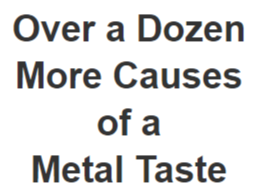
Is a metal taste in your mouth driving you mad?
A metal taste in the mouth is no laughing matter, as it can sometimes seem as though you’ve been sucking on a block of iron.
Though a metallic taste in the mouth can sometimes easily be explained by a recent nosebleed, there are other instances of metal taste in the mouth that have no apparent cause, and thus, no apparent solution.
All the Possible Causes — and There Are Many — of a Metallic Taste in Your Mouth
Once you know what’s causing this very unpleasant situation with your mouth, you’ll know what the solutions are.
For starters, medications can cause a metallic taste in the mouth, says Steven Y. Park, MD, Clinical Assistant Professor of Otolaryngology (ear, nose and throat) at New York Medical College.
“One of the most common medications is azithromycin or clarithromycin, or any of the macrolide antibiotics,” says Dr. Park, author of the book, “Sleep, Interrupted: A physician reveals the #1 reason why so many of us are sick and tired.”
Dr. Park adds, “Chemotherapy and anesthesia medications can do this as well.”
Can nutritional supplements be a culprit?
“Certain vitamins, especially those containing calcium or iron, can cause a metallic taste.”
What is the most serious disease that a metal flavor in the mouth can be a symptom?
Dr. Park explains, “Any systemic medical condition that upsets your body’s state of balance can cause you to have a metallic taste, just like weakness, headache, or pain.
“Think of the bad taste as a form of mild pain or a distorted sensation of the taste buds.
“If your nerve endings are hypersensitive (due to stress or illness), then they’ll over-react or react inappropriately.
“The same goes with the tongue, since it has three types of nerve endings: taste, sensation, motor.
“There are theories that propose that the perception of a bad/metallic taste is actually your brain’s misperception, kind of like ringing in the ear.”
What is the most common cause for this most annoying situation?
“I’m not aware of any studies rank ordering this condition, as it’s not a very well studied condition.”
How long would the metallic taste in the mouth have to persist before you recommend the person see a physician?
Dr. Park says, “A few months, at most.”
Can metal taste in mouth be caused by cancer?

Shutterstock/pathdoc
Dr. Park explains, “Any type of growth or trauma can irritate, displace, distort or grow into the nerve bundle that supplies taste. Even benign growths can do this too.
“There also can be general medical issues such as neurologic conditions, either in the tongue or even the brain, that can cause these symptoms.
“Just like pain, fever, or nausea, a metallic taste is not indicative of any specific medical condition.
“It’s only a symptom that can arise from various medical conditions.
“Overall, the chances that it’s due to cancer is very small. This is why a thorough history and upper airway exam is very important.”
Can food allergies cause this?
“Nothing in particular, but anything that upsets the body’s balance can bring on this symptom.
“B type vitamin deficiency has also been implicated. In severe cases, the metallic taste can turn into pain.”

Atlantadentist.com lists the following as possible causes for a metal taste in the mouth:
Gingivitis
Periodontitis
Tooth infections
Peptic ulcer
Lead poisoning
Bleeding gums
Too much dietary iron
Kidney disease
Copper overdose
Selenium toxicity
Iodine intoxication
Mercury poisoning
Atlantadentist.com also states: “When two types of metals are used in two different dental fillings a battery can be created. Some believe that it’s due to the mercury leakage from dental silver/mercury fillings. High protein diets can cause benign dietary ketosis.
“This has also been associated with a metal taste. It has also been associated with B 12 deficiency, zinc deficiency, Bell’s palsy, Strep throat and Sjogren’s disease.”
A cranial cerebral spinal fluid leak can also cause a metal taste in the mouth.
If the cause of the metallic taste hasn’t been figured out, what should a person do?
Dr. Park explains, “There isn’t one reason for metallic taste. A number of different conditions (including dental) can cause it.
“In general, you need to look over your entire medical history and overall state of health.
“It’s also important to make sure you’re sleeping well, as poor sleep can aggravate these type of conditions.
“Checking for any nasal or sinus conditions is also important. Acid reflux is another common condition that can alter your sensation.”
Keep in mind that a metallic sensation in your mouth is not a permanent situation, and it will likely resolve within a few months, if not a few weeks or even several days, especially if you’ve pinpointed the cause.
More on cerebrospinal fluid leak.
 Dr. Park practices integrative medicine and surgery, and has helped thousands of people breathe better and sleep better.
Dr. Park practices integrative medicine and surgery, and has helped thousands of people breathe better and sleep better.
 Lorra Garrick has been covering medical, fitness and cybersecurity topics for many years, having written thousands of articles for print magazines and websites, including as a ghostwriter. She’s also a former ACE-certified personal trainer.
Lorra Garrick has been covering medical, fitness and cybersecurity topics for many years, having written thousands of articles for print magazines and websites, including as a ghostwriter. She’s also a former ACE-certified personal trainer.
Sources: atlantadentist.com; cedars-sinai.edu/Patients/Health-Conditions/Cerebrospinal-Fluid-CSF-Leak.aspx












